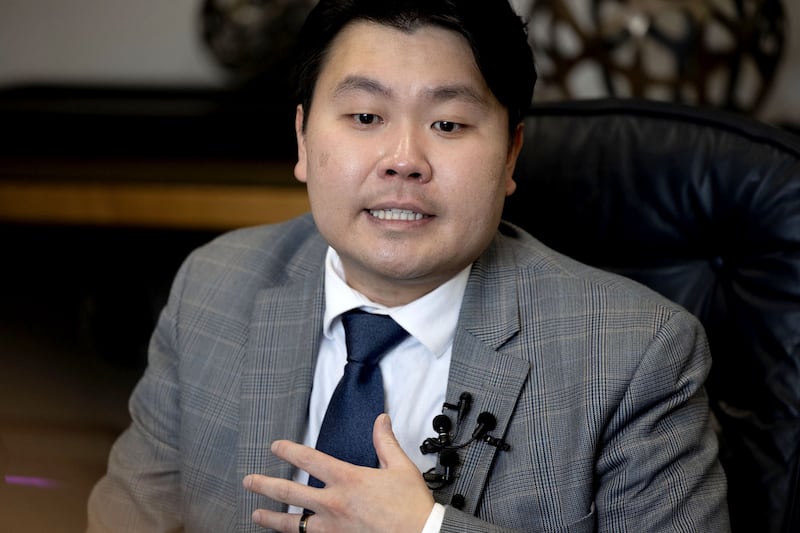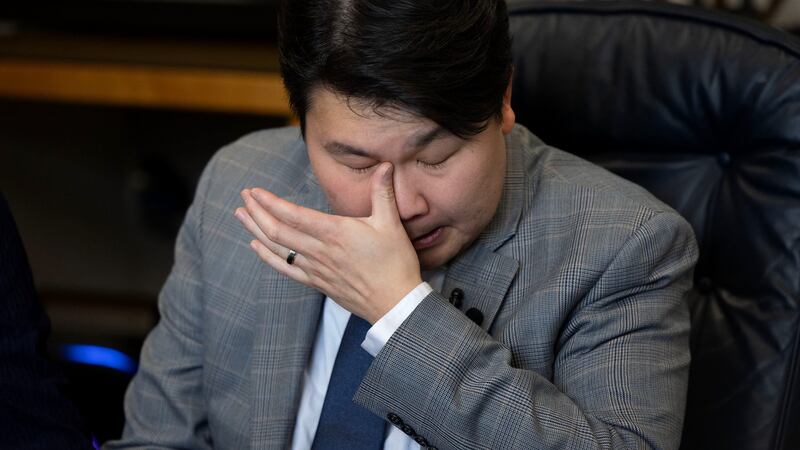MILLCREEK — Held inside a Colorado immigration detention facility, packed into a cell block with around 70 others, sleeping each night on a thin mat not knowing what the future held, John Shin says he sank into a depression.
The first day, after being shackled by immigration agents in Colorado Springs and sent to detention facility in Aurora, was particularly difficult.
“I was absolutely terrified. Obviously I cried all day,” he said.
The South Korean transplant to Utah, though, held on, refused to sign the paperwork immigration officials put in front of him even as he wondered how he would get out. Meantime, his supporters in the music community in Utah and beyond coalesced, clamored for his release.
“I did not want to give up because I have my family here,” said Shin, a violinist with a master’s degree in music performance from the University of Utah.
Ultimately, after 17 days inside the U.S. Immigration and Customs Enforcement Denver Contract Detention facility in Aurora, he got out. That was Thursday. By Friday, he was back in Utah, and he met with the media in the Millcreek office of his lawyer, Adam Crayk, accompanied by the lawyer and his wife, DaNae Snow.
“It’s been almost 10 hours right now, and I’ve never felt so grateful in my life to be out of that detention center and be home with my family again,” he said.
His case had spurred widespread attention in Utah, Colorado and the rest of the country, and he said that support — a letter-writing campaign, a benefit concert and more — helped keep him going while in Aurora. “Just when I thought there were no options and I might have to give up, there was hope again, and I don’t know how to thank my musician friends,” he said.

Still, his case — which underscores the expansive net federal authorities are casting as part of President Donald Trump’s crackdown on illegal immigration — is not resolved. Released on $25,000 bond set by an immigration judge on Tuesday, the federal government is still pursuing deportation, though Crayk is optimistic about his client’s prospects. The lawyer has started filing the paperwork to regularize Shin’s migratory status in the country and is optimistic he’ll ultimately be able to secure legal permanent residency for Shin, a green card.
Shin, Crayk maintains, was the victim of a quota system applicable to immigration agents spurred by Trump’s “mass deportation efforts.”
“There are requirements that every single day, X amount of people have to be taken into custody. That’s not a joke. That’s not fictitious. There are requirements, and John was a really, really easy, low-hanging fruit,” Crayk said. “Right now the idea is, arrest everyone and we’ll let the courts work it out and let the ICE agents work it out.”
‘Flagged’ and detained
Shin, who has played violin for the Utah Symphony and Ballet West, among other groups, is among the many immigrants across the country who have been swept up by immigration authorities in recent weeks and months. He is originally from South Korea but has lived in Utah since he was brought here by his parents as a child, legally entering on a tourist visa. He now lives in North Salt Lake.
His detention, he said, came as a surprise while he was in Colorado Springs for work. Employed in the telecommunications sector, he had been assigned to work on a cell tower at Fort Carson, a U.S. Army base near Colorado Springs. On trying to enter the installation, however, he was “flagged” due to the discrepancies in federal records in his migratory status. U.S. Department of Homeland Security officials subsequently reached out to him on Aug. 17, meeting with him at his Colorado Springs hotel, and he was taken into custody and placed in the Aurora facility the next day, Shin said.

Shin entered the country legally and subsequently maintained his migratory status over the years, securing standing to remain in the country under the Deferred Access for Childhood Arrivals program. DACA, as it’s known, is geared to immigrants brought to the United States by their parents as children. He lost that status after a conviction in Tooele County for driving while impaired due to alcohol consumption, a class B misdemeanor, in 2019. He married Snow, a U.S. citizen, in 2021, but never tried to rectify his migratory status, figuring in his detention by immigration officials.
Crayk said Shin’s legal entry into the United States and marriage to a U.S. citizen strongly bode in his favor in fending off deportation and securing legal residency. Shin, for his part, says his connection to the country is strong, regardless of his immigration paperwork.
“I want people to know that I consider myself an American. This is my home,” Shin said. “I went to elementary school, middle school, high school and college here, and all the friends and families that I know, they live in Utah.”

His backers, meantime, have focused on Shin’s character and contributions to the community.
“Everything about the whole situation just broke my heart, and so I was just so happy and so relieved to hear that everything that everyone was doing helped, that he was able to get out,” Nicole Fullmer, an oboist and longtime friend, said earlier Friday when news of Shin’s release started spreading. She’s friends with Shin and his wife, and in the wake of the man’s arrest had regularly played music at the state Capitol rotunda along with violinist Gabriel Gordon as a show of support.
Now, while Crayk continues legal efforts to defend Shin, the man says he wishes something could be done to improve the process to legally immigrate to the United States. His stay in the Colorado detention facility was tough, nerve-wracking and uncomfortable, but he offered praiseworthy words for the majority of the other immigrants he mixed with, most of them from China.
“They did not commit any crime. They entered legally — most of them entered legally. They’re wonderful people,” he said.

